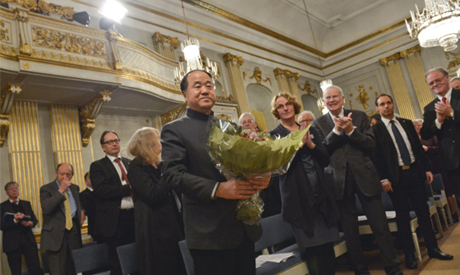
The 2012 Nobel Literature Prize laureate, Mo Yan of China receives applause from Academy members after speaking during the traditional Nobel lecture Friday Dec. 7, 2012 at the Royal Swedish Academy in Stockholm, Sweden. (AP Photo/Jonas Ekstromer)
Chinese Nobel literature laureate Mo Yan on Friday took a swipe at his critics in the traditional Nobel lecture, saying their target "had nothing to do" with him and urging them to read his books.
The writer has walked a tightrope during his stay in Stockholm, where he will pick up the award on Monday, with some pundits supporting his own claims that he is "independent", and others casting him as a Beijing stooge.
Mo Yan is the vice-chairman of the government-backed China Writers' Association, and the country's state-run media have hailed him as a national hero.
"The announcement of my Nobel Prize has led to controversy. At first I thought I was the target of the disputes, but over time I've come to realise that the real target was a person who had nothing to do with me," he said on Friday.
The best way for a writer to speak was through his work, he argued, adding that everything he needed to say could be found there. "Speech is carried off by the wind; the written word can never be obliterated," he told the audience.
He wrapped up the annual Nobel Lecture in Literature with a sarcastic comment seemingly aimed at his critics: "Many interesting things have happened to me in the wake of winning the prize and they have convinced me that truth and justice are alive and well."
Elsewhere in the Swedish Academy reading, the Chinese writer honoured his illiterate mother, who held people who could read in high regard but who also worried that her son's story-telling could land him in trouble.
"Talkative kids are not well thought of in our village, for they can bring trouble to themselves and to their families," he said.
At a press conference on Thursday, the writer stood by his call for the release of jailed compatriot and Nobel Peace Prize winner Liu Xiaobo, but refused to elaborate on the issue.
"I have already issued my opinion about this matter," he said, in response to questions from journalists.
The Chinese staged a black-out on coverage of human rights champion Liu's 2010 Nobel win. He is still serving an 11-year prison sentence handed down on Christmas Day 2009 after leading a manifesto for democratic change called Charter 08.
Friday's lecture came after more than 130 previous Nobel laureates published an open letter Tuesday, urging the Chinese Communist Party's new chief Xi Jinping to release Liu.
Among Mo's harshest critics has been previous Nobel literature laureate Herta Mueller. Last month, she said she wanted to cry when she heard he had been given the prestigious award.
This year, she said, he had been among several Chinese writers to have hand-copied a speech by the late Communist ruler Mao Zedong as part of a commemorative book in his honour. In that particular speech, Mao insisted that art and culture should support the Communist Party.
After his Thursday press conference, the media largely focused on Mo's ambiguous comments about censorship. While opposing it, he did add that it was sometimes necessary, comparing it with airport security. "Whether China has freedom of speech is a very difficult question," he added.
Swedish newspaper Svenska Dagbladet on Friday said the writer's comments that the Nobel Prize was "personal" and not "for a country" could nevertheless be seen as a snub to the Chinese establishment.
"He made it clear to Chinese journalists that the prize has not been given to China, where it is being used on patriotic grounds," it wrote.
The paper compared this year's choice by the Swedish Academy with 1974 winner Harry Martinson, a Swede who was also criticised for not being political enough.
"Today (Martinson's) work appears foresighted. Perhaps it's only in hindsight that we can judge when the Academy has made the right call?" it said.
It also quoted Shelley W Chan, the US-based author of a book on Mo Yan, who called his writing "brave". Chan accused his critics of not having read his work.
She argued that some of his criticism of the Chinese regime is quite explicit while some was more indirect. Parts of it could be seen as referencing the 1989 Tiananmen Square massacre, still a taboo subject in Chinese society, she added.
Short link: